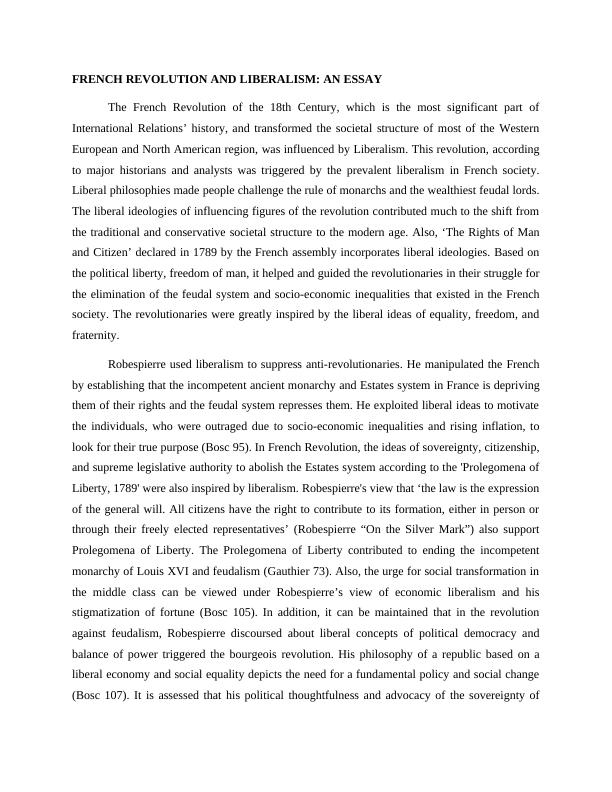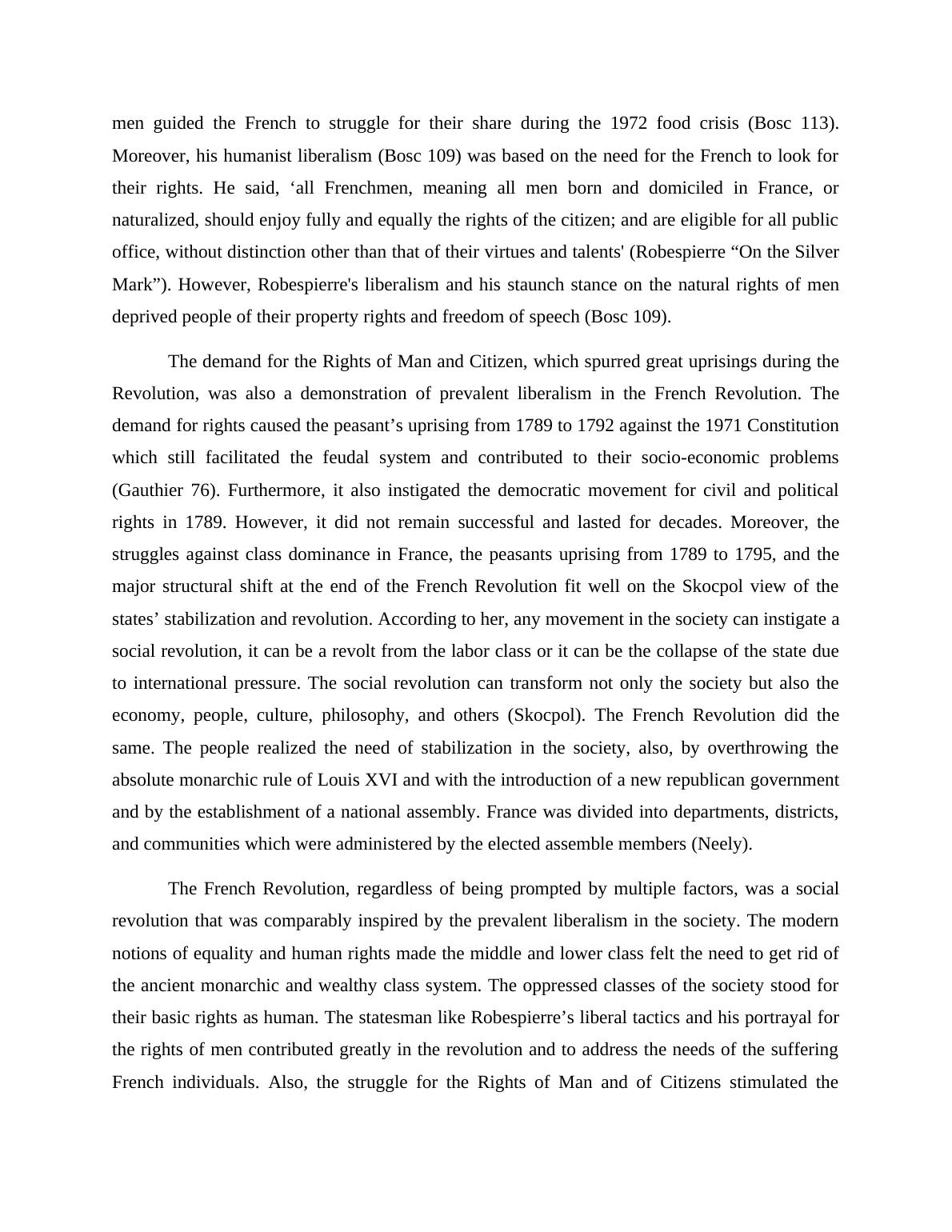French Revolution and Liberalism Essay 2022
4 Pages1179 Words56 Views
Added on 2022-10-03
French Revolution and Liberalism Essay 2022
Added on 2022-10-03
ShareRelated Documents
FRENCH REVOLUTION AND LIBERALISM: AN ESSAY
The French Revolution of the 18th Century, which is the most significant part of
International Relations’ history, and transformed the societal structure of most of the Western
European and North American region, was influenced by Liberalism. This revolution, according
to major historians and analysts was triggered by the prevalent liberalism in French society.
Liberal philosophies made people challenge the rule of monarchs and the wealthiest feudal lords.
The liberal ideologies of influencing figures of the revolution contributed much to the shift from
the traditional and conservative societal structure to the modern age. Also, ‘The Rights of Man
and Citizen’ declared in 1789 by the French assembly incorporates liberal ideologies. Based on
the political liberty, freedom of man, it helped and guided the revolutionaries in their struggle for
the elimination of the feudal system and socio-economic inequalities that existed in the French
society. The revolutionaries were greatly inspired by the liberal ideas of equality, freedom, and
fraternity.
Robespierre used liberalism to suppress anti-revolutionaries. He manipulated the French
by establishing that the incompetent ancient monarchy and Estates system in France is depriving
them of their rights and the feudal system represses them. He exploited liberal ideas to motivate
the individuals, who were outraged due to socio-economic inequalities and rising inflation, to
look for their true purpose (Bosc 95). In French Revolution, the ideas of sovereignty, citizenship,
and supreme legislative authority to abolish the Estates system according to the 'Prolegomena of
Liberty, 1789' were also inspired by liberalism. Robespierre's view that ‘the law is the expression
of the general will. All citizens have the right to contribute to its formation, either in person or
through their freely elected representatives’ (Robespierre “On the Silver Mark”) also support
Prolegomena of Liberty. The Prolegomena of Liberty contributed to ending the incompetent
monarchy of Louis XVI and feudalism (Gauthier 73). Also, the urge for social transformation in
the middle class can be viewed under Robespierre’s view of economic liberalism and his
stigmatization of fortune (Bosc 105). In addition, it can be maintained that in the revolution
against feudalism, Robespierre discoursed about liberal concepts of political democracy and
balance of power triggered the bourgeois revolution. His philosophy of a republic based on a
liberal economy and social equality depicts the need for a fundamental policy and social change
(Bosc 107). It is assessed that his political thoughtfulness and advocacy of the sovereignty of
The French Revolution of the 18th Century, which is the most significant part of
International Relations’ history, and transformed the societal structure of most of the Western
European and North American region, was influenced by Liberalism. This revolution, according
to major historians and analysts was triggered by the prevalent liberalism in French society.
Liberal philosophies made people challenge the rule of monarchs and the wealthiest feudal lords.
The liberal ideologies of influencing figures of the revolution contributed much to the shift from
the traditional and conservative societal structure to the modern age. Also, ‘The Rights of Man
and Citizen’ declared in 1789 by the French assembly incorporates liberal ideologies. Based on
the political liberty, freedom of man, it helped and guided the revolutionaries in their struggle for
the elimination of the feudal system and socio-economic inequalities that existed in the French
society. The revolutionaries were greatly inspired by the liberal ideas of equality, freedom, and
fraternity.
Robespierre used liberalism to suppress anti-revolutionaries. He manipulated the French
by establishing that the incompetent ancient monarchy and Estates system in France is depriving
them of their rights and the feudal system represses them. He exploited liberal ideas to motivate
the individuals, who were outraged due to socio-economic inequalities and rising inflation, to
look for their true purpose (Bosc 95). In French Revolution, the ideas of sovereignty, citizenship,
and supreme legislative authority to abolish the Estates system according to the 'Prolegomena of
Liberty, 1789' were also inspired by liberalism. Robespierre's view that ‘the law is the expression
of the general will. All citizens have the right to contribute to its formation, either in person or
through their freely elected representatives’ (Robespierre “On the Silver Mark”) also support
Prolegomena of Liberty. The Prolegomena of Liberty contributed to ending the incompetent
monarchy of Louis XVI and feudalism (Gauthier 73). Also, the urge for social transformation in
the middle class can be viewed under Robespierre’s view of economic liberalism and his
stigmatization of fortune (Bosc 105). In addition, it can be maintained that in the revolution
against feudalism, Robespierre discoursed about liberal concepts of political democracy and
balance of power triggered the bourgeois revolution. His philosophy of a republic based on a
liberal economy and social equality depicts the need for a fundamental policy and social change
(Bosc 107). It is assessed that his political thoughtfulness and advocacy of the sovereignty of

men guided the French to struggle for their share during the 1972 food crisis (Bosc 113).
Moreover, his humanist liberalism (Bosc 109) was based on the need for the French to look for
their rights. He said, ‘all Frenchmen, meaning all men born and domiciled in France, or
naturalized, should enjoy fully and equally the rights of the citizen; and are eligible for all public
office, without distinction other than that of their virtues and talents' (Robespierre “On the Silver
Mark”). However, Robespierre's liberalism and his staunch stance on the natural rights of men
deprived people of their property rights and freedom of speech (Bosc 109).
The demand for the Rights of Man and Citizen, which spurred great uprisings during the
Revolution, was also a demonstration of prevalent liberalism in the French Revolution. The
demand for rights caused the peasant’s uprising from 1789 to 1792 against the 1971 Constitution
which still facilitated the feudal system and contributed to their socio-economic problems
(Gauthier 76). Furthermore, it also instigated the democratic movement for civil and political
rights in 1789. However, it did not remain successful and lasted for decades. Moreover, the
struggles against class dominance in France, the peasants uprising from 1789 to 1795, and the
major structural shift at the end of the French Revolution fit well on the Skocpol view of the
states’ stabilization and revolution. According to her, any movement in the society can instigate a
social revolution, it can be a revolt from the labor class or it can be the collapse of the state due
to international pressure. The social revolution can transform not only the society but also the
economy, people, culture, philosophy, and others (Skocpol). The French Revolution did the
same. The people realized the need of stabilization in the society, also, by overthrowing the
absolute monarchic rule of Louis XVI and with the introduction of a new republican government
and by the establishment of a national assembly. France was divided into departments, districts,
and communities which were administered by the elected assemble members (Neely).
The French Revolution, regardless of being prompted by multiple factors, was a social
revolution that was comparably inspired by the prevalent liberalism in the society. The modern
notions of equality and human rights made the middle and lower class felt the need to get rid of
the ancient monarchic and wealthy class system. The oppressed classes of the society stood for
their basic rights as human. The statesman like Robespierre’s liberal tactics and his portrayal for
the rights of men contributed greatly in the revolution and to address the needs of the suffering
French individuals. Also, the struggle for the Rights of Man and of Citizens stimulated the
Moreover, his humanist liberalism (Bosc 109) was based on the need for the French to look for
their rights. He said, ‘all Frenchmen, meaning all men born and domiciled in France, or
naturalized, should enjoy fully and equally the rights of the citizen; and are eligible for all public
office, without distinction other than that of their virtues and talents' (Robespierre “On the Silver
Mark”). However, Robespierre's liberalism and his staunch stance on the natural rights of men
deprived people of their property rights and freedom of speech (Bosc 109).
The demand for the Rights of Man and Citizen, which spurred great uprisings during the
Revolution, was also a demonstration of prevalent liberalism in the French Revolution. The
demand for rights caused the peasant’s uprising from 1789 to 1792 against the 1971 Constitution
which still facilitated the feudal system and contributed to their socio-economic problems
(Gauthier 76). Furthermore, it also instigated the democratic movement for civil and political
rights in 1789. However, it did not remain successful and lasted for decades. Moreover, the
struggles against class dominance in France, the peasants uprising from 1789 to 1795, and the
major structural shift at the end of the French Revolution fit well on the Skocpol view of the
states’ stabilization and revolution. According to her, any movement in the society can instigate a
social revolution, it can be a revolt from the labor class or it can be the collapse of the state due
to international pressure. The social revolution can transform not only the society but also the
economy, people, culture, philosophy, and others (Skocpol). The French Revolution did the
same. The people realized the need of stabilization in the society, also, by overthrowing the
absolute monarchic rule of Louis XVI and with the introduction of a new republican government
and by the establishment of a national assembly. France was divided into departments, districts,
and communities which were administered by the elected assemble members (Neely).
The French Revolution, regardless of being prompted by multiple factors, was a social
revolution that was comparably inspired by the prevalent liberalism in the society. The modern
notions of equality and human rights made the middle and lower class felt the need to get rid of
the ancient monarchic and wealthy class system. The oppressed classes of the society stood for
their basic rights as human. The statesman like Robespierre’s liberal tactics and his portrayal for
the rights of men contributed greatly in the revolution and to address the needs of the suffering
French individuals. Also, the struggle for the Rights of Man and of Citizens stimulated the

End of preview
Want to access all the pages? Upload your documents or become a member.
Related Documents
History Assignment | French Revolutionlg...
|6
|1196
|751
(solved)Assignment : Atlantic Revolutionslg...
|6
|1497
|343
